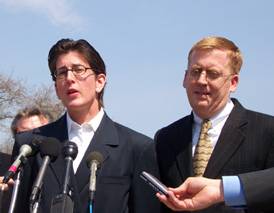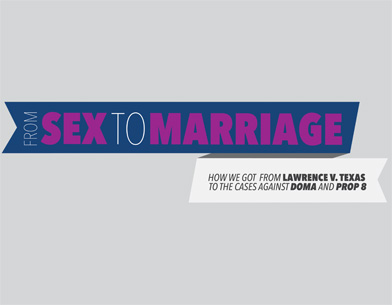
From Sex to Marriage: The Legal Strategy
Blog Search
In the blog series From Sex to Marriage: How We Got From Lawrence v. Texas to the Cases Against DOMA and Prop 8, we ask key players in Lambda Legal’s biggest victory to discuss the importance of the landmark case, and its impact on the marriage cases currently before the Supreme Court.
Here’s an introduction by Executive Director Kevin M. Cathcart, and a conversation with Mitchell Katine, an attorney in private practice who received the phone call that set the Lawrence case in motion.
In this installment, Ruth Harlow, former Legal Director for Lambda Legal, discusses our legal strategy on Lawrence. Harlow is a partner at the law firm of Pepper Hamilton in New York. The National Law Journal named her named her Lawyer of the Year in 2003 and one of the Most Influential Lawyers of the Decade in 2010.
I still recall the day when Suzanne Goldberg came into my office, after having received a phone call from Mitchell Katine, and told me about the arrests in John Lawrence’s apartment and the pending “deviant sexual intercourse” charges against John and Tyron. Suzanne and I both knew immediately that the charges against them—for consensual sodomy in a private home—could tee up a strong challenge to Bowers v. Hardwick and its sweeping endorsement of sodomy laws. Wiping away the stinging holding of the Supreme Court in Bowers and the excuse for all kinds of antigay discrimination that it provided was a central—indeed, an essential—goal of the LGBT rights movement.
But it is critical to recall which side initially propelled the case forward and gave us that opportunity. It was the police department and the prosecutor in the State of Texas. When beat cops brought in two men on charges of private sexual activity in one of their homes, their superiors in the police department could have said, “This is an abusive use of our power. Let’s drop the charges.” Even more so, the prosecutor (upon reviewing the record and the actions of the police) could have realized that spending precious resources on prosecuting these men for consensual sex at home was misguided.
Neither the police nor the prosecutor ever explained any public safety or other legitimate government interest in pursuing such charges, nor could they have (as should have been obvious). But the police and the prosecutor vigorously pursued the charges and defended the men’s convictions all the way to the Supreme Court precisely because those state actors simply wanted to retain the criminal-law power to exert control over and to condemn gay men and lesbians as “deviant” at any time.
So Texas was propelling the case forward, and Lambda Legal needed to devise a strategy to turn that state’s aggression into a major victory for LGBT civil rights. Lambda Legal and its sister organizations had already laid important groundwork for John and Tyron’s equal protection claim with the 1996 victory at the Supreme Court in Romer v. Evans. And we had learned much about the practicalities of due-process jurisprudence in the 17 years since Bowers, which led Lambda Legal to firmly plant John and Tyron’s due-process claim in the word liberty in the Bill of Rights—rather than in an unarticulated right to privacy.
Even more important, however, than doctrinal legal strategy was our all-out effort to undo the faulty factual premises on which Bowers rested. We needed to expose Bowers as resting on a toppling tripod with three illusory legs: first, a false history that mistakenly painted antigay laws as age-old and innate to Western civilization; second, a false assumption that gay sexual intimacy had no connection to family relationships; and third, an erroneous sense within the Bowers majority that sodomy laws did not matter much (despite their ubiquitous use as the excuse for antigay policies and decisions), because they were rarely enforced as a direct matter.
We won Lawrence v. Texas because we so thoroughly and deeply convinced the majority of the Court in 2003 that it should be embarrassed by the sloppy quality of Bowers’ factual reasoning on those three scores, and that it should, instead, eloquently affirm our equal humanity. The Court did so by describing our full and “transcendent” liberty right to engage in private sexual conduct with an adult partner, without fear of interference or punishment by the state—and without fear of criminal sodomy laws’ use as a license to discrimination in other contexts.
Next: Roger Poindexter, Regional Director at Lambda Legal’s Dallas office, will recall the state of the LGBT community in Texas at the time of the Lawrence case.





